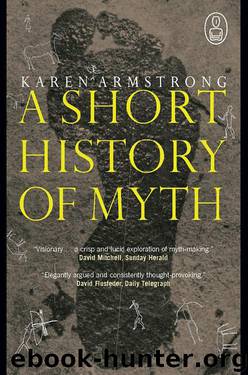A Short History of Myth by Karen Armstrong

Author:Karen Armstrong
Language: eng
Format: mobi, epub
Tags: Social Science, Myth, Literary Criticism, Fiction, Fairy Tales, Myth History, Reference, Folklore & Mythology
ISBN: 9780676974249
Publisher: Random House, Inc.
Published: 2006-08-15T10:00:00+00:00
vi
The Post-Axial Period (c. 200 BCE to c. 1500 CE)
Hitherto in our historical survey, we have concentrated on the major intellectual, spiritual and social revolutions that forced human beings to revise their mythology. After the Axial Age, there would be no comparable period of change for over a millennium. In spiritual and religious matters, we still rely on the insights of the Axial sages and philosophers, and the status of myth remained basically the same until the sixteenth century CE. In the rest of this history, we shall concentrate on the West, not just because the next period of innovation began there, but also because Western people had already begun to find mythology problematic. We shall also concentrate on the Western religions, because the three monotheistic faiths claim, at least in part, to be historically rather than mythically based. The other major traditions have a less ambivalent attitude to myth. In Hinduism, history is regarded as ephemeral and illusory, and therefore unworthy of spiritual consideration. Hindus feel more at home in the archetypal world of myth. Buddhism is a deeply psychological religion, and finds mythology, an early form of psychology, quite congenial. In Confucianism, ritual has always been more important than mythical narratives. But Jews, Christians and Muslims believe that their god is active in history and can be experienced in actual events in this world. Did these events really happen or are they ‘only’ myths? Because of the uneasy attitude to myth which had entered the Western mind with Plato and Aristotle, monotheists would periodically try to make their religion conform to the rational standards of philosophy, but most would finally conclude that this had been a mistake.
Judaism had a paradoxical attitude towards the mythology of other peoples. It seemed antagonistic towards the myths of other nations, but yet would sometimes draw upon these foreign stories to express the Jewish vision. Furthermore, Judaism continued to inspire more myths. One of these was Christianity. Jesus and his first disciples were Jewish and strongly rooted in Jewish spirituality, as was St Paul, who can be said to have transformed Jesus into a mythical figure. This is not intended to be pejorative. Jesus was a real historical human being, who was executed in about 30 CE by the Romans, and his first disciples certainly thought that he had – in some sense – risen from the dead. But unless a historical event is mythologised, it cannot become a source of religious inspiration. A myth, it will be recalled, is an event that – in some sense – happened once, but which also happens all the time. An occurrence needs to be liberated, as it were, from the confines of a specific period and brought into the lives of contemporary worshippers, or it will remain a unique, unrepeatable incident, or even a historical freak that cannot really touch the lives of others. We do not know what actually happened when the people of Israel escaped from Egypt and crossed the Sea of Reeds, because the story has been written as a myth.
Download
This site does not store any files on its server. We only index and link to content provided by other sites. Please contact the content providers to delete copyright contents if any and email us, we'll remove relevant links or contents immediately.
| Fairy Tales | Folklore |
| Mythology |
Circe by Madeline Miller(8126)
Confessions of an Ugly Stepsister by Gregory Maguire(7878)
A Court of Wings and Ruin by Sarah J. Maas(7817)
Burn for You (Slow Burn Book 1) by J.T. Geissinger(7084)
The Bird and the Sword by Amy Harmon(5348)
A Lesson in Thorns (Thornchapel Book 1) by Sierra Simone(5077)
Into the Drowning Deep by Mira Grant(4474)
Stolen (Alpha's Control Book 1) by Addison Cain(4181)
The Queen and the Cure (The Bird and the Sword Chronicles Book 2) by Amy Harmon(4146)
Mythology by Edith Hamilton(3765)
Pernicious Red (When The Wicked Play Book 1) by Natalie Bennett(3514)
Run Little Wolf (The Forest Pack Series Book 1) by G. Bailey(3510)
The Queen and the Cure by Amy Harmon(3313)
(Maiden Lane #5) Lord of Darkness by Elizabeth Hoyt(3076)
Lost Boy by Christina Henry(3012)
Mythos by Stephen Fry(2862)
The Fairy Queen (The Dark Queens Book 6) by Jovee Winters(2810)
Persephone by Kitty Thomas(2699)
Bunny by Mona Awad(2434)
